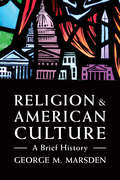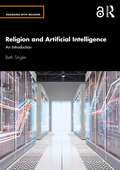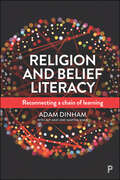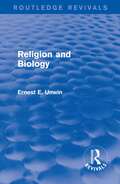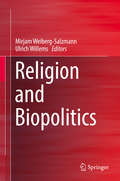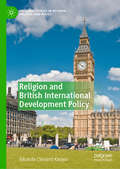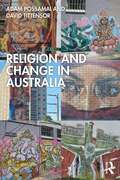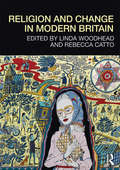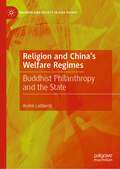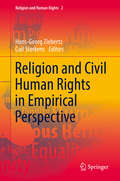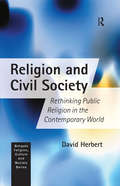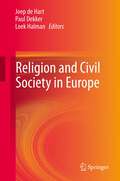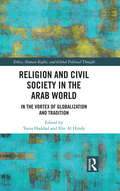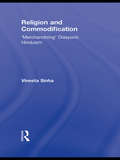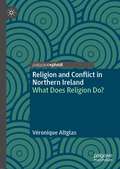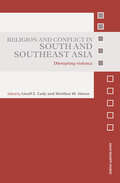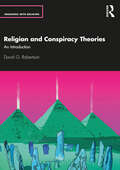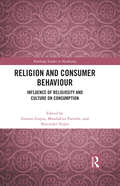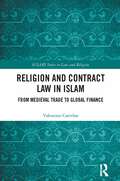- Table View
- List View
Religion and American Culture: A Brief History
by George M. MarsdenWhile Americans still profess to be one of the most religious people in the industrialized world, many aspects of American culture have long been secular and materialistic. That is just one of the many paradoxes, contradictions, and surprises in the relationship between Christianity and American culture. In this book George Marsden, a leading historian of American Christianity and award-winning author, tells the story of that relationship in a concise and thought-provoking way.Surveying the history of religion and American culture from the days of the earliest European settlers right up through the elections of 2016, Marsden offers the kind of historically and religiously informed scholarship that has made him one of the nation&’s most respected and decorated historians. Students in the classroom and history readers of all ages will benefit from engaging with the story Marsden tells.
Religion and American Culture: A Brief History
by George M. MarsdenWhile Americans still profess to be one of the most religious people in the industrialized world, many aspects of American culture have long been secular and materialistic. That is just one of the many paradoxes, contradictions, and surprises in the relationship between Christianity and American culture. In this book George Marsden, a leading historian of American Christianity and award-winning author, tells the story of that relationship in a concise and thought-provoking way.Surveying the history of religion and American culture from the days of the earliest European settlers right up through the elections of 2016, Marsden offers the kind of historically and religiously informed scholarship that has made him one of the nation&’s most respected and decorated historians. Students in the classroom and history readers of all ages will benefit from engaging with the story Marsden tells.
Religion and American Education
by Warren A. NordWarren Nord's thoughtful book tackles an issue of great importance in contemporary America: the role of religion in our public schools and universities. According to Nord, public opinion has been excessively polarized by those religious conservatives who would restore religious purposes and practices to public education and by those secular liberals for whom religion is irrelevant to everything in the curriculum. While he maintains that public schools and universities must not promote religion, he also argues that there are powerful philosophical, political, moral, and constitutional reasons for requiring students to study religion. Indeed, only if religion is included in the curriculum will students receive a truly liberal education, one that takes seriously a variety of ways of understanding the human experience. Intended for a broad audience, Nord's comprehensive study encompasses American history, constitutional law, educational theory and practice, theology, philosophy, and ethics. It also discusses a number of current, controversial issues, including multiculturalism, moral education, creationism, academic freedom, and the voucher and school choice movements.
Religion and Artificial Intelligence: An Introduction (Engaging with Religion)
by Beth SinglerArtificial intelligence (AI) is rarely out of the news or the public imagination. Images of red-eyed Terminators illustrate press accounts of incremental advances in medical diagnosis, facial recognition, natural language processing, and robotics. Such advances are transforming society through measurable impacts on people’s decisions and opportunities.Religion and Artificial Intelligence: An Introduction explores an emerging field with a religious studies approach, drawing on cultural and digital anthropological methods to demonstrate the entanglements of religion and AI, our imaginaries of these objects and our ideas about their utopian or dystopian futures. It addresses key topics, including the following: What AI is and is not. How religions are reacting to AI with examples of rejection, adoption, and adaptation. How established religions understand creation and place human-like AI within that. How overtly secular and even ‘new atheist’ groups understand AI as a tool for liberation from human evolution and religion. Religious visions of superintelligent AI. This engaging book is essential for anyone considering the relationship between religion, science and technology, and interested in the questions raised by transhumanism, posthumanism, and new religious movements.The Open Access version of this book, available at http://www.taylorfrancis.com, has been made available under A creative Commons Attribution-Non Commercial-No Derivatives (CC-BY-NC-ND) 4.0 license.
Religion and Authoritarianism
by Karrie J. KoeselThis book provides a rare window into the micropolitics of contemporary authoritarian rule through a comparison of religious-state relations in Russia and China - two countries with long histories of religious repression, and even longer experiences with authoritarian politics. Drawing on extensive fieldwork in multiple sites in these countries, this book explores what religious and political authority want from one another, how they negotiate the terms of their relationship, and how cooperative or conflicting their interactions are. This comparison reveals that while tensions exist between the two sides, there is also ample room for mutually beneficial interaction. Religious communities and their authoritarian overseers are cooperating around the core issue of politics - namely, the struggle for money, power, and prestige - and becoming unexpected allies in the process.
Religion and Belief Literacy: Reconnecting a Chain of Learning
by Adam DinhamThis book presents a crisis of religion and belief literacy to which education at every level is challenged to respond. As understanding different religions, beliefs and influences becomes increasingly important, it fills a gap for a resource in bringing together the debates around religious literacy, from theoretical approaches to teaching and policy. This timely publication provides a clear pathway for engaging well with religion and belief diversity in public and shared settings.
Religion and Biology
by Ernest E. UnwinFirst published in 1922, this book represents an attempt to outline the biological approach to the questions of religious thought. The author posits the book as a contribution to religious thought in relation to the purpose of God in Nature, providing readers with an overview of the advances and changes in thought that had occurred in the years before the book was written. The examinations of the nature of man and of evolution in relation to religion make up the bulk of the book along with a look at the argument from beauty. The book will be of interest to students of religion, biology and philosophy.
Religion and Biopolitics
by Mirjam Weiberg-Salzmann Ulrich WillemsGiven the profound moral-ethical controversies regarding the use of new biotechnologies in medical research and treatment, such as embryonic research and cloning, this book sheds new light on the role of religious organizations and actors in influencing the bio-political debates and decision-making processes. Further, it analyzes the ways in which religious traditions and actors formulate their bio-ethical positions and which rationales they use to validate their positions. The book offers a range of case studies on fourteen Western democracies, highlighting the bio-ethical and political debates over human stem cell research, therapeutic and reproductive cloning, and pre-implantation genetic diagnosis. The contributing authors illustrate the ways in which national political landscapes and actors from diverse and often fragmented moral communities with widely varying moral stances, premises and commitments formulate their bio-ethical positions and seek to influence political decisions.
Religion and British International Development Policy (Palgrave Studies in Religion, Politics, and Policy)
by Aikande Clement KwayuThis book studies the relationship between British government and faith groups in its international development agenda within and beyond the context of Brexit. It includes aspects of International Relations, International Development, and Religion and Politics to trace the relationship between the British government and faith groups, showing that the relationship is enhanced on three conditions: (i) the resurgence of religion in international affairs; (ii) the attitudes of politicians and political parties towards the third sector (i.e. voluntary and private sectors); and (iii) the rising prominence of the international development agenda in British politics. The third condition triggers the need to understand this relationship in the wake of Brexit. Thus, the book aims to analyze to what extent the increasing prominence of an international development agenda in British politics explains the relationship between the government and faith groups, and ultimately whether Brexit has increased the prominence of international development agenda and brought faith groups into closer relations with the government.
Religion and Change in Australia
by Adam Possamai David TittensorThis timely book offers a panoramic overview of the enduring significance of religion in modern Australian society. Applying sociological perspectives and contemporary theories of religion in society, it challenges conventional assumptions around the extent of secularisation in Australia and instead argues that religious institutions, groups, and individuals have proved remarkably adaptable to social change and continue to play a major role in Australian life. In doing so, it explores how religion intersects with a wide range of other contemporary issues, including politics, race, migration, gender, and new media. Religion and Change in Australia explores Australia’s unique history regarding religion. Christianity was originally imported as a tool of social control to keep convicts, settlers, and Australian Aboriginal peoples in check. This had a profound impact on the social memory of the nation, and lingering resentment towards the "excessive" presence of religion continues to be felt today. Freedom of religion was enshrined in Section 116 of the Australian Constitution in 1901. Nevertheless, the White Australia Policy effectively prevented adherents of non-Christian faiths from migrating to Australia and the nation remained overwhelmingly Christian. However, after WWII, Australia, in common with other western societies, appears to have become increasingly secularised, as religious observance declined dramatically. However, Religion and Change in Australia employs a range of social theories to challenge this securalist view and argues that Australia is a post-secular society. The 2016 census revealed that over half of the population still identify as Christian. In politics, the socially conservative religious right has come to exert considerable influence on the ruling Liberal-National Coalition, particularly under John Howard and Scott Morrison. New technologies, such as the Internet and social media, have provided new avenues for religious expression and proselytisation whilst so-called "megachurches" have been built to cater to their increasing congregations. The adoption of multiculturalism and increased immigration from Asia has led to a religiously pluralist society, though this has often been controversial. In particular, the position of Islam in Australia has been the subject of fierce debate, and Islamophobic attitudes remain common. Atheism, non-belief, and alternative spiritualities have also become increasingly widespread, especially amongst the young. Religion and Change in Australia analyses these developments to offer new perspectives on religion and its continued relevance within Australian society. This book is therefore a vital resource for students, academics, and general readers seeking to understand contemporary debates surrounding religion and secularisation in Australia.
Religion and Change in Modern Britain
by Linda Woodhead Rebecca CattoThis book offers a fully up-to-date and comprehensive guide to religion in Britain since 1945. A team of leading scholars provide a fresh analysis and overview, with a particular focus on diversity and change. They examine: relations between religious and secular beliefs and institutions the evolving role and status of the churches the growth and ‘settlement’ of non-Christian religious communities the spread and diversification of alternative spiritualities religion in welfare, education, media, politics and law theoretical perspectives on religious change. The volume presents the latest research, including results from the largest-ever research initiative on religion in Britain, the AHRC/ESRC Religion and Society Programme. Survey chapters are combined with detailed case studies to give both breadth and depth of coverage. The text is accompanied by relevant photographs and a companion website.
Religion and China's Welfare Regimes: Buddhist Philanthropy and the State (Religion and Society in Asia Pacific)
by André LalibertéThis book presents the welfare regime of China as a liminal space where religious and state authorities struggle for legitimacy as new social forces emerge. It offers a unique analysis of relations between religion and state in the People’s Republic of China by presenting how the Chinese Communist Party (CCP) tries to harness Buddhist resources to assist in the delivery of social services and sheds light on the intermingling of Buddhism and the state since 1949. This book will appeal to academics in social sciences and humanities and broader audiences interested in the social role of religions, charity, NGOs, and in social policy implementation. The author explores why the CCP turns to Buddhist followers and their leaders and presents a detailed view of Buddhist philanthropy, contextualized with an historical overview, a regional comparative perspective, and a review of policy debates. This book contributes to our understanding of secularity in a major non-Western society influenced by religions other than Christianity.
Religion and Civil Human Rights in Empirical Perspective
by Hans-Georg Ziebertz Carl SterkensThis volume offers an empirical perspective on the so-called first generation of human rights. It explores the legitimization of these human rights by individual people, both because of their religion and because of their vision of what constitutes human dignity. The book addresses such issues as the foundation of human rights, the necessity of a broader conversation about human rights, aspects of freedom of religion, and the role of religion in Belarus, Britain, Chile, Germany, Italy, Nigeria, Norway and Tanzania. Taking an international comparative perspective, the volume answers the question as to what extent adolescents in different countries support civil human rights and what influences their attitudes towards these rights. As the diversity of the contributions in this volume shows, the relationship between religion and civil human rights is complex and multifaceted. Studying this complicated relationship calls for a variety of theoretical perspectives and rigorous empirical testing in different national contexts. This book's empirical approach provides an important complementary perspective for legal, political and public debates.
Religion and Civil Society: Rethinking Public Religion in the Contemporary World (Religion, Culture and Society Series)
by David HerbertThis book presents the first full-length study of the relationship between religion and the controversial concept of civil society. Across the world in the last two decades of the twentieth century religions re-entered public space as influential discursive and symbolic systems apparently beyond the control of either traditional religious authorising institutions or states. This differentiation of religion from traditional institutions and entry into secular public spheres carries both dangers and possible benefits for democracy. Offering a fresh interdisciplinary approach to understanding religion in contemporary societies, this book provides an invaluable resource for students and researchers in religious studies, sociology, politics and political philosophy, theology, international relations and legal studies. Part one presents a critical introduction to the interaction between religion, modernization and postmodernization in Western and non-Western settings (America, Europe, the Middle East and India), focussing on discourses of human rights, civil society and the public sphere, and the controversial question of their cross-cultural application. Part two examines religion and civil society through case studies of Egypt, Bosnia and Muslim minorities in Britain, and compares Poland as an example of a Christian majority society that has experienced the public reassertion of religion.
Religion and Civil Society in Europe
by Paul Dekker Loek Halman Joep De HartReligion is back again in Europe after never having been gone. It is manifest in the revival of religious institutions and traditions in former communist countries, in political controversies about the relationship between the church(es) and the state and about the freedom of religion and the freedom to criticize religion, and in public unease about religious minorities. This book is about religion and civil society in Europe. It moves from general theoretical and normative approaches of this relationship, via the examination of national patterns of religion-state relations, to in-depth analyses of the impact of religion and secularization on the values, pro-social attitudes and civic engagement of individuals. It covers Europe from the Lutheran North to the Catholic South, and from the secularized West to the Orthodox East and Islamic South-East with comparative analyses and country studies, concluding with an overall Europe-USA comparison.
Religion and Civil Society in the Arab World: In the Vortex of Globalization and Tradition (Ethics, Human Rights and Global Political Thought)
by Tania Haddad Elie Al HindyThis book examines the links between civil society, religion and politics in the Middle East and North Africa region. The chapters in the volume explore the role of religion in shaping and changing the public sphere in regions that are developing and/or in conflict. They also discuss how these relations are reflected on civil society organizations and the role they are expected to play in transitional periods. This volume: investigates the conceptual dilemmas regarding what is ‘civil society’ in the Arab world today examines the dynamic roles of civil society organizations and religion in the Middle East and North Africa explores the future of the Arab civil society post-‘Arab Spring’ events, and how the latter continues to reshape the demand for democracy in the region. A comprehensive study of how the Arab civil society has come into being and its changing roles, this eclectic work will be of interest to scholars and researchers of politics, especially political Islam, international relations, Middle East Studies, African Studies, sociology and social anthropology.
Religion and Cognition: A Reader (Critical Categories in the Study of Religion)
by D. Jason SloneThe cognitive science of religion examines the mental processes that govern religious belief and behaviour. It offers a fresh and exciting approach to the scientific study of religion. 'Religion and Cognition' brings together key essays which outline the theory and illustrate this with experimental case material. The central topics in this new critical field of research are all addressed: meta-theoretical arguments for cognitive explanations of religion; theoretical models of cognition employed in the cognitive science of religion; prominent cognitive theories of religion; methods used to gather data and test theories; and experimental findings by cognitive scientists of religion.
Religion and Commodification: 'Merchandizing' Diasporic Hinduism (Routledge Research in Religion, Media and Culture)
by Vineeta SinhaSustaining a Hindu universe at an everyday life level requires an extraordinary range of religious specialists and ritual paraphernalia. At the level of practice, devotional Hinduism is an embodied religion and grounded in a materiality, that makes the presence of specific physical objects (which when used in worship also carry immense ritual and symbolic load) an indispensable part of its religious practices. Traditionally, both services and objects required for worship were provided and produced by occupational communities. The almost sacred connection between caste groups and occupation/profession has been clearly severed in many diasporic locations, but importantly in India itself. As such, skills and expertise required for producing an array of physical objects in order to support Hindu worship have been taken over by clusters of individuals with no traditional, historical connection with caste-related knowledge. Both the transference and disconnect just noted have been crucial for the ultimate commodification of objects used in the act of Hindu worship, and the emergence of an analogous commercial industry as a result. These developments condense highly complex processes that need careful conceptual explication, a task that is exciting and carries enormous potential for theoretical reflections in key fields of study. Using the lens of ‘visuality’ and ‘materiality,’ Sinha offers insights into the everyday material religious lives of Hindus as they strive to sustain theistic, devotional Hinduism in diasporic locations--particularly Singapore, Malaysia, and Tamilnadu--where religious objects have become commodified.
Religion and Conflict in Northern Ireland: What Does Religion Do?
by Véronique AltglasNorthern Ireland presents a fundamental challenge for the sociology of religion – how do religious beliefs, attitudes and identities relate to practices, violence and conflict? In other words, what does religion do?These interrogations are at the core of this book. It is the first critical and comprehensive review of the ways in which the social sciences have interpreted religion’s significance in Northern Ireland. In particular, it examines the shortcomings of existing interpretations and, in turn, suggests alternative lines of thinking for more robust and compelling analyses of the role(s) religion might play in Northern Irish culture and politics.Through, and beyond, the case of Northern Ireland, the second objective of this book is to outline a critical agenda for the social study of religion, which has theoretical and methodological underpinnings. Finally, this work engages with epistemological issues which never have been addressed as such in the Northern Irish context: how do conflict settings affect the research undertaken on religion, when religion is an object of political and violent contentions? By analysing the scope for objective and critical thinking in such research context, this critical essay intends to contribute to a sociology of the sociology of religion.
Religion and Conflict in South and Southeast Asia: Disrupting Violence (Asian Security Studies)
by Linell E. Cady Sheldon W. SimonA major new contribution to comparative and multidisciplinary scholarship on the alignment of religion and violence in the contemporary world, with a special focus on South and Southeast Asia. Religion and Conflict in South and Southeast Asia shows how this region is the site of recent and emerging democracies, a high degree of religious pluralism, the largest Muslim populations in the world, and several well-organized terrorist groups, making understanding of the dynamics of religious conflict and violence particularly urgent. By bringing scholars from religious studies, political science, sociology, anthropology and international relations into conversation with each other, this volume brings much needed attention to the role of religion in fostering violence in the region and addresses strategies for its containment or resolution. The dearth of other literature on the intersection of religion, politics and violence in contemporary South and Southeast Asia makes the timing of this book particularly relevant. This book will of great interest to advanced undergraduate and postgraduate students of Asian politics, security studies and conflict studies.
Religion and Conflict Resolution: Christianity and South Africa's Truth and Reconciliation Commission
by Megan ShoreThis book examines the ambiguous role that Christianity played in South Africa's Truth and Reconciliation Commission (TRC). It has two objectives: to analyse the role Christianity played in the TRC and to highlight certain consequences that may be instructive to future international conflict resolution processes. Religion and conflict resolution is an area of significant importance. Ongoing conflicts involving Palestinians and Israelis, Muslims and Hindus, and even radical Islamic jihadists and Western countries have heightened the awareness of the potential power of religion to fuel conflict. Yet these religious traditions also promote peace and respect for others as key components in doing justice. Examining the potential role religion can play in generating peace and justice, specifically Christianity in South Africa's TRC, is of utmost importance as religiously inspired violence continues to occur. This book highlights the importance of accounting for religion in international conflict resolution.
Religion and Conspiracy Theories: An Introduction (Engaging with Religion)
by David G. RobertsonReligion and Conspiracy Theories: An Introduction is the first accessible volume to systematically examine the relationship between religion and conspiracy theories in the contemporary world in critical and historical perspective.It lays out the historical development of these important categories, considers different theoretical approaches and looks at case studies of conspiracy theories in religion, about religion and as religion. It maintains a critical perspective throughout on the relationship between truth and power, and in the process provides a fresh perspective on belief and worldviews in our modern world.Designed for use in the classroom, the book features helpful diagrams and resources for teachers. It is an essential read for all students of religion and conspiracy theories, as well as scholars of politics, religious studies, sociology, anthropology and cultural studies.
Religion and Consumer Behaviour: Influence of Religiosity and Culture on Consumption (Routledge Studies in Marketing)
by Gaurav Gupta Mandakini Paruthi Shivinder NijjerReligion is an important part of individual lives, playing a major role in our decision making and puchasing. Understanding the influence of religion on consumer behaviour is therefore an essential practice for business. The COVID-19 pandemic has especially enhanced the influence of consumers’ religiosity on their consumption decisions. This book concentrates on understanding the relationship of religiosity with various aspects of consumption and consumer behaviour to improve policy and build on an under represented topic. In this edited collection, expert contributors, academicians and researchers discuss the influence of religion on consumer behaviour in depth including the “dark side” of religion on consumers’ consumption behaviour and religious cults. The chapters also explore the ethical issues surrounding consumption and the role of religion on branding and sustainable practices. With a broad perspective, the book draws on examples of practices from Christianity, Islam, Hinduism and Buddhism. This book will be a particularly valuable resource for scholars and upper level students of marketing, consumer behaviour and consumer psychology. The interdisciplinary perspectives will also appeal to those studying sociology and globalization.
Religion and Contemporary Art: A Curious Accord
by Ronald R. BernierReligion and Contemporary Art sets the theoretical frameworks and interpretive strategies for exploring the re-emergence of religion in the making, exhibiting, and discussion of contemporary art. Featuring essays from both established and emerging scholars, critics, and artists, the book reflects on what might be termed an "accord" between contemporary art and religion. It explores the common strategies contemporary artists employ in the interface between religion and contemporary art practice. It also includes case studies to provide more in-depth treatments of specific artists grappling with themes such as ritual, abstraction, mythology, the body, popular culture, science, liturgy, and social justice, among other themes. It is a must-read resource for working artists, critics, and scholars in this field, and an invitation to new voices "curious" about its promises and possibilities.
Religion and Contract Law in Islam: From Medieval Trade to Global Finance (ICLARS Series on Law and Religion)
by Valentino CattelanWhat is a contract in Islam? Is it an aspect of Muslim religion or of secular life? How much has it changed over the centuries? Undertaking a search that spans revelation, legal tradition, and the reality of the Muslim world, this book explores the Islamic contract (‘aqd in Arabic) as a ‘city’ at the crossroads of convergent paths of translation, comparison, and law in context. In particular, the book shows that only by re-orienting traditional categories of Western law-religion toward the East can an alternative path of discovery for the ‘aqd be advanced. Hence, through a fortuitous encounter with an Arab Girl, the reader will (re-)visit the Temple of Western modernity and explore a city ruled by Towers of dialectical forces, carrying a hermeneutical Ring that combines dialectics, Islamic studies, and media theory. This interdisciplinary approach will not only enrich our knowledge of the ‘aqd but also make it more understandable as a cultural and social construction to which both Muslims and non-Muslims have participated in forging its multiple representations. By inviting the readers ‘to know who they are’ while looking at her, the Arab Girl is already waiting for us to listen to the Islamic contract in a new way. By applying a distinctive law and religion approach to the study of the contract in Islam, the book provides a comprehensive exploration of a topic that is of interest to legal and economic comparatists as well as to readers in anthropology, Islamic and cultural studies, and it is also of topical meaning for today’s international lawyers and the operators of an increasingly multicultural and transnational market.
